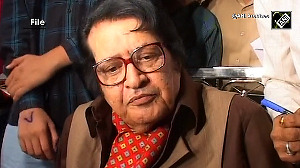British scientists have been granted a one-year license to clone a human embryo. And they could begin work in a couple of days.
If successful, the British will be the second in the world to have cloned human embryo cells. Earlier this year, South Korean scientists announced their cloning feat though it was far from being definitive.
UK's Human Fertilisation and Embryology Authority, a government funded organisation, has allowed a team at the University of Newcastle upon Tyne to conduct the cloning experiments.
The authority's license allows the scientists to study ways of cloning human embryos efficiently. And it allows for harvesting of stem cells from such embryos so as to better understand diseases and develop their medical treatments. But the license is explicit about permitting experiments for research purpose only.
Stem cells are master cells that can differentiate into different kinds of cells in the body. This allows scientists to use the stem cells to build cells of almost any tissue. And, because the cells grown in the lab are from the cloned embryo of the patient, the patient's body will not reject them. 'Spare parts' for the human body; if you will.
Professor Alison Murdoch of the Newcastle NHS Fertility Centre and Dr Miodrag Stojkovic of Newcastle University applied for the license in February. Their original aim was to seek the license for developing a cure for diabetes. They wanted to attempt growing a type-1 diabetic's tissues in the lab for purpose of transplanting them into the patient.
However, when they perceived a threat of delay due to opposition form pro-life, anti-cloning pressure groups, they dropped the original application and went for one that granted the research at a preliminary level and did not aim at any specific illness.
Cloning of human embryo has always held out promise of miracle cures for illnesses ranging from Alzheimer's and Parkinson's to diabetes and even paralysis.
The Wednesday decision to grant the license follows the British Parliament's 2001 vote that permits cloning for therapeutic reasons only. Reproductive cloning is still banned.
Protests
The granting of this license has recharged the human cloning debate.
For one, Britain has isolated itself some more from the international community on the issue of human cloning. Only a few nations like South Korea, China and Singapore allow human cloning.
Several pro-life and religious groups are seeking a ban on all kinds of human cloning. There is increasing pressure on governments to collaborate on a global ban.
The kernel argument against all cloning efforts is that cloning essentially involves the destruction of a human embryo, which, the anti-cloning lobby sees as destruction of human life.
Josephine Quintavalle of Comment on Reproductive Ethics has been quoted as saying that, "It is very worrying indeed. We have decisions of this magnitude being taken by an unelected government quango No human life should be sacrificed for the benefit of anybody else, no matter how dramatic the promises are."
The Roman Catholic Church backs the Linacre Centre for Healthcare Ethics. Its director, Helen Watt, has been quoted as saying that, "Therapeutic cloning creates a human life in exactly the same way as reproductive cloning does. The only difference is that the embryo is intended not for birth but for laboratory destruction."
However, Professor Murdoch claims, "We have had overwhelming support from senior scientists and clinicians from all over the world and many letters from patients who may benefit from the research Realistically, we have at least five years of further laboratory work to do before we move to clinical trials but this could be reduced if we receive additional funding."






 © 2025
© 2025